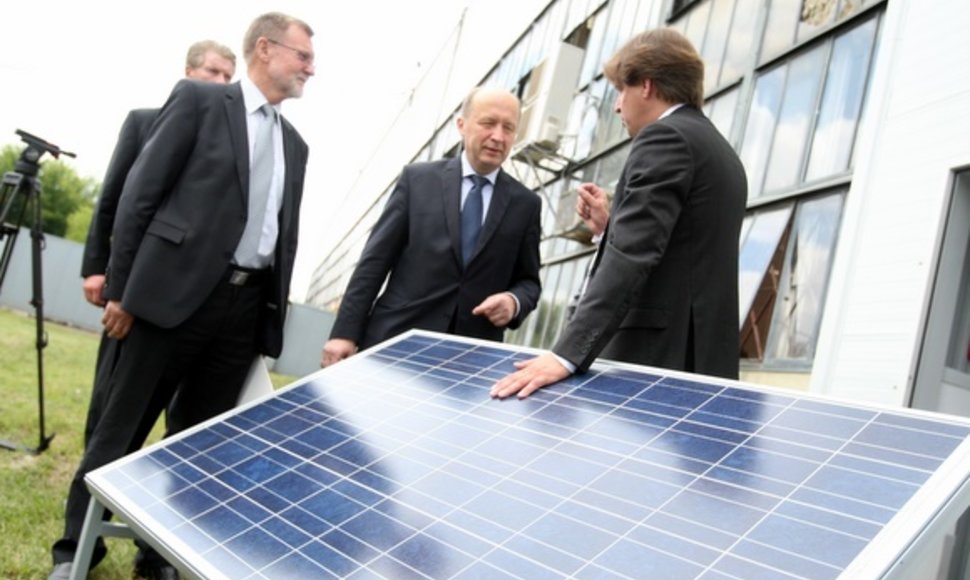“We did it all ourselves – we produced our own panels, we installed them, we launched the power plants. Solar panel plant in Bulgaria is the first and the most extensive Lithuanian-capital project in renewable solar energy,” Precizika CEO Tomas Baranauskas is deservedly proud.
The investment into a 1.5-megawatt solar power plant totalled 2.5 million euros.
“While everyone else in Lithuania only talks about solar energy – much like they talk about basketball and ecology – we are demonstrating something more than ideas and plans, we can show tangible results and completed investments into high-quality Lithuanian products abroad,” Precizika CEO says.
According to him, the production cost of “Solet” panels is covered after seven years of operation, after which they generate pure profits.
- Your company's ambition to establish itself in a foreign market re-affirms the old rule that one cannot be a prophet in one's own neighbourhood?
- We are simply too big for the Lithuanian market with our potential. Our projected annual capacity is 65 MW. In Lithuania, the limit on solar energy sector is set at 10 MW. The state has determined this as the maximum quota for solar electricity. We could produce solar panels for that capacity in two months – so, naturally, we look for export markets.
Yet there is another proverb that we do not wish to affirm, one about a shoemaker who always walks barefooted. We are waiting for calls for tenders in Lithuania for solar energy parks – we will definitely offer our services.
- Did you have to take part in a national contest in order to build a solar power plant in Bulgaria?
- They do not have national contests there. The state territory is divided into zones with certain capacity limits assigned to each of them, to assure an evenly-distributed network load. We work with Bulgarian partners who applied to fill in that capacity and won the right to develop a power plant.
- Officially, Precizika produced its first solar panel in July 2011. Less than a year passed and you're already boasting of significant achievements. How did you manage it?
- We ventured into production from an industrial lab where we develop new technologies and basic components for solar panels. We started in 2008 and still continue with it.
The first industrial assembly line for Lithuanian solar modules was launched on 7 July last year. We spent several months on experimental regime, but by the end of the year we were running at full capacity. So for us, the factory started production on 1 January this year.
We didn't build a factory from scratch – we purchased tried and tested technology from 3S (Swiss Solar Systems), owned by a big Swiss concern Meyer Burger, a leader in solar energy production, in my opinion.
Solar power plant is a long-term project. Due to the so-called power loss or degradation we grant our production a 25-year warranty. If it happens that something breaks down and needs replacement, it is important that the producer that sold you the thing stays in operation for as long as the panel itself. Solar panels in the entire plant must be identical, one cannot replace them with something of different capacity or configuration.
- You claim to be the first, the latest, and the only solar panel producer in the Baltic States. Who are your competitors?
- The entire world, in fact, but we don't see Chinese producers as our competition. The Chinese are doing a rather mediocre job in terms of quality, if not downright poor.
Of course, there are many reliable international producers who make their products in China, but we are not afraid of them, since we compete on equal grounds, according to the same rules. The so-called “garage production”, meanwhile, is not a worthy competitor, since their production cost structure is simply ridiculous: they hardly pay anything to exploited Chinese workers, the state covers electricity costs and, finally, no one knows what component parts they are using. The US has already shut its solar panel market to the Chinese and Europe is planning to follow the suit.
When I talk to a client, I always say this: Give it a thorough thought before you buy a product as we are talking about 25 years. If you save 5-15 percent today, it's nothing compared to losses if the panel starts degrading in two or three years.
- If I wanted to install a solar panel on my rooftop, what sums of money are we talking about?
- For personal consumption, a 3-6 kilowatt panel would suffice. If we are talking about a rooftop facility, each watt of capacity costs about 5 litas (1.4 euro). Do your calculations.
There has been much cost dynamism in recent years. Back in 2006-2008, similar installations would cost 3 to 3.5 euro per watt (10-12 litas). And now – only 5 litas. If state policies remain supportive, I see solar panel technology becoming even cheaper with growth in production volumes, even though less dramatically. The price should approach a rather psychologically acceptable limit – about one euro per watt. If that happens, solar energy will be able to compete with other sources.
Investment should pay off within five to seven years, depending on whether one uses own or borrowed capital. After that, producing electricity costs nothing.
- People say that now is the time to invest into solar plants as Lithuania pays high price for solar energy.
- It might seem so but only at first glance. If we are talking about solar facilities with capacity above 1 MW, Lithuania pays 1.03 litas per kWh, while Bulgaria – only 0.85 litas. However, the rate is set for 20 years in Bulgaria and not 12, like in Lithuania. So if you calculate the return on investment and incentives, Bulgaria provides a 60-percent better environment because of longer terms. In fact, many European countries set their rates for much longer periods than Lithuania.
Solar energy in Lithuania
Lithuanians who have faith in solar energy are rushing to install facilities by the end of the year, because in that case, they will be able to sell electricity to a state-run company, LESTO, at 1.8 litas (0.52 euro) per kWh for 12 years.
The rate applies only to electricity produced by facilities integrated into buildings with a total capacity of under 30 kW. Owners of more powerful plants or ones installed in other fashion get relatively less.
Producers expect that Lithuania might change rates at which it buys solar energy starting in 2013. The new rates will only apply to facilities built after that date. The government has set a target of producing at least 23 percent of energy from renewable sources by 2020.
At the moment, there are around 40 solar energy plants in the country supplying electricity to LESTO. Many producers, however, use up electricity thus produced for their own needs.













